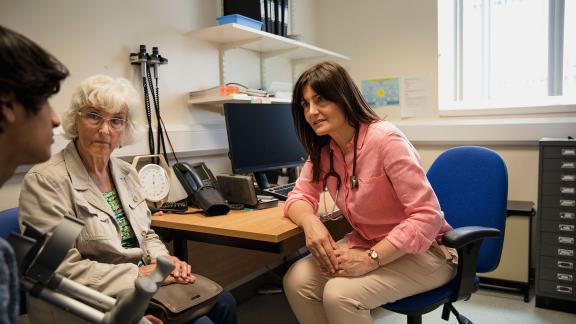NHS procurement: the vital role of NEDs

It’s now nearly a year since I took over as interim chair of NHS Supply Chain and I have been reflecting on the world of NHS procurement, where it has come from and where it might be going.
I am old enough to remember a range of approaches to ‘supplies’, as we used to refer to it. As a junior nurse, one of the tasks I had was to undertake the ward stocktake. It helped fill an otherwise boring Sunday afternoon and got me out of the weekend cleaning. I can’t imagine that any clinical staff these days have any downtime that needs filling on Sundays, or any other day.
There was the introduction of regional distribution centres, a switch to ward-level top-up systems and restrictions put on representatives to stop them from taking you out for lunch. But realistically, as a clinician and later as a manager, I didn’t give procurement much thought. We had the items we needed, not least because everyone had a secret hoard just in case. We didn’t think about what they cost, where they came from or who got them for us. In the same way a surgeon and their scrub nurse work together, you put your hand out and whatever you needed was there.
A strategic and cross-cutting issue
Many years later as a chief executive of a large trust, I became much more interested in the world of procurement internally, across the system and nationally. This was driven by my involvement in establishing and hosting an academic health science network, running one of the national test beds in collaboration with multiple industry partners, and looking for opportunities to improve efficiency in non-pay spend.
However, notwithstanding my personal interest, on reflection, I never thought about discussing our overall approach to procurement with my board as a key strategic and cross-cutting issue. My chief financial officer (CFO) and I were interested in how we shopped, what we bought and from whom, but didn’t think of it more broadly.
Even three years ago when I first joined NHS Supply Chain and talking with chief executive colleagues about what we were doing, in many cases I got the same sort of reaction that technology pioneers used to get: “Anything about IT….talk to my IT director.” In this case the response was “the board won’t be interested but my head of procurement and my CFO might be”.
Supply chain resilience
What a difference two years can make. A global pandemic plus EU-Exit, plus sustainability, have certainly had an impact.
The increased importance sustainability issues and ethical procurement is raising new questions about sourcing strategies
The past two years have been incredibly challenging for everyone; in no way am I trivialising the human cost of that. However, it has also demonstrated some of the fragility and risk of shopping when the whole world is trying to buy the same things at the same time.
Suddenly supply chain resilience was really challenged and was having a direct effect on clinical risk and practice. The financial impacts of increased costs of raw materials, workforce and logistics is adding pressure to the economy, both within the NHS and more generally.
The increased importance and awareness of sustainability issues and ethical procurement is raising new questions about sourcing strategies alongside the changes in legislation regarding social value. If you add in the need for transformation of pathways, innovation to improve patient outcomes and safety and post-COVID-19 recovery, at a time when the workforce is exhausted and stretched, then it’s clear to me that procurement can have a massive role to play.
Wider determinants of health
Integrated care systems are uniquely placed to develop a more strategic approach to procurement
If these things don’t raise the profile of procurement within NHS boards and systems as a strategic issue worthy of discussion, then I am not sure what will.
During times like this where the NHS is under significant pressure and staff are working extremely hard to deliver high quality patient care in challenging circumstances, the independent oversight and support that a NED can provide around procurement and supply is important. For frontline staff, finding the capacity to step back, assess the options and if necessary implement change can be difficult and NEDs have the ability to keep abreast of changes and opportunities across the system and provide guidance and direction which could help deliver against the targets for their trust or ICS.
As the national procurement and supply chain partner for the NHS, NHS Supply Chain works closely with procurement, finance and clinical teams to ensure their needs and challenges are fully understood. Only with the strength of this partnership are we able to tackle the greatest challenges together and find the solutions we need for the longer term. This includes supporting efficiency savings in non-pay areas which mean fewer cuts being made to critical services, along with working hard to find innovative ways to deliver on Net Zero targets, taking some of the pressure off providers by offering sustainable products and reducing carbon emissions and waste across the whole supply chain. Working in partnership also means we can find ways together to reduce the administrative burden and release clinical time to care.
Ensuring products that clinicians use meet regulatory standards, deliver the best patient outcomes, are designed with safety in mind and are fit for purpose is fundamental to high quality care. NEDs can seek assurances about how the trust makes sure all those conditions are met in the most cost-effective way, utilising the expertise of various bodies across the NHS system (e.g. NICE, MHRA, DHSC, NHSE and NHS Supply Chain) to ensure that the organisation is getting the best support it can to deliver safe and effective care. Through these national systems, processes are already in place to assure quality of products, as well as identify and mitigate safety concerns quickly and on a national scale.
The emerging integrated care systems are uniquely placed to develop a more strategic approach to procurement across bigger populations across the whole of health and social care, ensuring not just quality, safety and efficiency but delivering enhanced value and better health and wellbeing.
An important priority for each ICS is to improve life expectancy and tackle some of the wider determinants of health.
As clinicians seek to transform pathways, deliver care closer to home and maximise the opportunities that the ICS’s bring there is a willingness to look at value based procurement and innovative approaches that deliver greater value across organisational boundaries rather than taking a single organisational approach. NEDs can help to stimulate that wider system thinking in terms of value both for patients and the tax payer.
More than just shopping
While the NHS depends on procurement of high-quality and safe products with transactions made, from my perspective, it’s so much more than just shopping.
When was the last time your board discussed procurement and its role in your strategy for improving health outcomes?
Heather Tierney-Moore OBE is interim chair at NHS Supply Chain.



